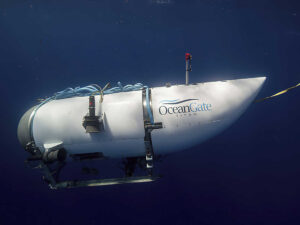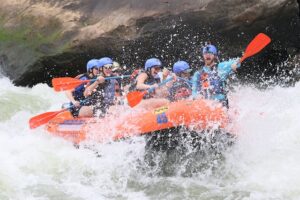The catastrophic implosion of OceanGate’s submersible craft resulted in the death of all five people on board, and captured media attention around the globe. While the complete story continues to unfold, early reporting suggests that these deaths may have been avoidable.

Photo credit: AP – Copyright: OceanGate Expeditions
CEO Stockton Rush, known by many as a maverick explorer, made a number of controversial decisions in the construction of his submersible that likely contributed to its ultimate failure. Rush was on board the Titan when it imploded and perished alongside his clients. As such, we will never know why he did not address several red flags concerning the structural integrity of his vessel.
This mystery notwithstanding, many question whether the passengers aboard the craft were fully aware of the risks they were taking before they agreed to participate in this undersea mission. Most wonder whether there is any recourse available to their families in the aftermath of this tragedy. As is the case with most adventure tourism activities, often the answers can often be found in the fine print of the documents signed by the involved parties.

Stockton Rush, CEO of OceanGate Expeditions – Copyright: CBC
What is a liability waiver?
Liability waivers are contracts given by activity providers to their customers for endorsement prior to participation. Adventure tourism companies almost always ask participants to sign these waivers prior to embarking on recreational activities that carry some measure of risk.
Liability waivers can also be referred to as:
- Waivers
- Releases
- Disclaimers
- Indemnification agreements
- Hold harmless agreements
- Assumption of risk forms
- Exculpatory agreements
Did the passengers aboard the Titan sign liability waivers?
Those onboard the Titan submersible did sign liability waivers prior to their departure. As the incident occurred in international waters, these contracts dictated that any disputes would be governed by the laws of the Bahamas, where the company OceanGate Expeditions, Ltd. Is registered. Whether these waivers are enforceable remains an open question that will undoubtedly be the focus of intense litigation in the coming months.
While legal experts predict that if the Bahamian laws are not favorable to the families, they may try to bring the lawsuit to their home countries, this possibility is murky. The incident took place in a regulatory “no man’s land” and jurisdiction could be difficult to establish.

In Virginia, what happens if I sign a waiver and still get hurt?
Although pre-injury liability waivers are enforceable in many states, most waivers are not enforceable in Virginia. This is because they present an unfair proposition for the participant, who will not know the following things in advance:
- Whether the program is safe
- Whether the facilities are up to date
- Whether the equipment is safe and in good condition
- Whether the provider adheres to all applicable statutes, regulations, and safety standards
- Whether the provider will take the appropriate steps to ensure customer safety. In fact, signing a liability waiver might make the provider less inclined to exercise ordinary care to prevent harm, as they may believe they are fully shielded from liability.
For these reasons, the Supreme Court of Virginia voted to not enforce pre-injury liability waivers in the Commonwealth. For more information, visit this page.
What type of companies should be vetted for safety precautions?
Any business that offers an activity where a customer has the potential to be injured, or even killed, deserves a closer look at the fine print in their contract documents and the reviews provided by former participants. These activities include:
- Parasailing
- Scuba diving
- Flying lessons
- White water rafting
- Bungee jumping
- Skydiving
- Rock climbing
- Hang gliding
- Spelunking/caving
- Flyboarding on a water jet
- Hot air balloon rides
- Base jumping
- Go-Karting
- Water skiing
How to vet the safety of adventure tourism companies
Most adventure-seekers look for their next thrill in the summer months. From scuba diving to base jumping, the great outdoors offers many ways to get an adrenaline rush. And while many companies will vie for your business, it’s best to vet the accreditations and reviews ahead of time.
Some things you should learn about before taking the leap are as follows:
- Does the business properly follow a safety management system? ISO, the International Standardization Organization created a pamphlet for adventure tourism companies, listing out a detailed set of standards for companies to adhere to, depending on the type of activities. This way, best practices are streamlined, instead of leaving individual companies to “wing it.” Ask the company if they follow the ISO guidelines for adventure tourism companies. If not, inquire as to what guidelines they follow, and research your findings.
- Read the reviews. Don’t just be content with five stars – read the negative reviews as well. Here is why: A company could earn an average of five stars just by having three five-star reviews, created by the employees, or their family and friends. Three reviews are not enough to provide a complete picture, so aim for businesses that have many reviews, and look into what the naysayers are complaining about.
- Check the accreditations. Every type of activity has a set of accreditations and regulations set for their specific industry. Always check to ensure the company is in the good graces of the governing bodies that set the standards. Examples include:
- For skydiving, ensure that the company is recognized by the United States Parachute Association (USPA).
- For whitewater rafting, double-check that your instructor (or raft captain) has an ROA (Rafting Operator Accreditation) by the International Rafting Federation.
- Ask around. If you have friends or people you follow on social media that are enthusiasts about, say, water skiing, ask them which companies they would recommend, and take advantage of their insight.
Things you can do to have a safer adventure
Follow the below safety tips, and you will have peace of mind when you embark on your next adventure.
- Go with the older guide. They say the older, the wiser, and this could not be more true when it comes to adventure tourism. The older guides have been around. They’ve seen things, they’ve gotten out of tough situations, and they’ve been humbled by mother nature. Younger instructors aren’t only less experienced, but their youth might lend to a hubris that could put the group at a higher risk of danger when met with obstacles.
- Opt for the safety gear. Perhaps ice traction cleats or life vests aren’t necessary. But if they get you that much closer to a safe experience, strap yourself in.
- Ask questions. Do not be afraid of looking like a novice. Guides are there to help us navigate through adventures, and are being paid to provide the best experience possible. This includes educating customers on things they would like to know.
If you are plotting your summer adventure, you are at least equipped with the tools necessary to make smart decisions around what to do, and who you should be doing it with.
If you or a loved one have been injured while participating in any adventure tourism activity, and this injury was due to another’s negligence, you may be entitled to compensation. The experienced attorneys at Allen & Allen can guide you through the nuances of the laws, and let you know if you have a case. For a free consultation, call 866-388-1307 today.






